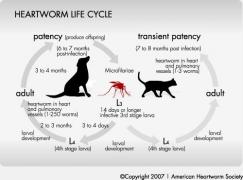Heartworm Prevention

Heartworm Prevention
Are heartworms becoming resistant to preventive medications?
This week marks the first day of spring and for many dogs and cats, spring means a trip to the veterinarian’s office for a heartworm test and renewal of a prescription for heartworm prevention.
To help me address the timely topic of “heartworm disease,” I invited a recognized expert, Dr. Clarke Atkins, to provide some insight.
Q: Do dogs really need an annual test — and should dog owners stop giving the preventative medication when winter comes?
A: Year-around preventive and yearly testing are solidly recommended by the Companion Animal Parasite Council (CAPC) and the American Heartworm Society for these important reasons:
- Heartworm infections are actually greater than 10 years ago, making annual testing critical for your dog.
- Year-around preventive provides a safety net of prevention for your dog.
- Current heartworm preventives provide protection against other year round pests.
- Starting and stopping preventive administration has the potential to lead to lapses in preventive therapy.
- People in the metro New York area — those who either vacation at or have homes in “heartworm-endemic areas” — may be at risk year round.
- Financial savings are modest and very small compared to the cost of treating a heartworm infection.
Q: Some dog owners are worried about overmedicating their dogs and give the heartworm medication every other month. Do you advise this protocol?
A: The practice of every other month administration of preventive is frankly a terrible idea. Lapses of greater than 45 days between treatments can result in heartworm infection.
Q: Are cats susceptible to heartworms and should they be on preventative medications like dogs?
A: Cats are susceptible to heartworm infection, although less so than dogs, and there is no practical and safe treatment for this life-threatening disease in cats. In any region in which heartworm preventive is used in dogs, cats absolutely should be on heartworm preventive, even if they are housed indoors. Interestingly, in a study we carried out several years ago, the exposure rate to heartworms in cats in NYC was 5% and on Long Island was 9%.
Q: I’ve heard heartworms are becoming resistant to medication. What should a dog owner do?
A: In certain areas of the southern U.S. — specifically Arkansas, Louisiana, Tennessee and Mississippi — there are concerns with increasing reports of “lack of effectiveness” from medications, and there is some evidence to suggest that some heartworm preventives are not perfect against all strains of heartworm.
Pet owners should talk with their veterinarian if they have any concerns in this regard. However, the most important thing is that all pets receive heartworm preventive medications.
My thanks to Dr. Clarke Atkins, Diplomate, ACVIM (Internal Medicine and Cardiology) and the Jane Lewis Seaks Distinguished Professor at North Carolina State University, for his time and response to important questions about heartworm disease.
The Companion Animal Parasite Council tracks parasitic diseases in dogs and cats–including heartworms. The map below is courtesy of CAPC:
__________________________________________________________
This blog may also be found in the “Tales from the Pet Clinic” blog from WebMD.
For over a century, The Animal Medical Center has been a national leader in animal health care, known for its expertise, innovation and success in providing routine, specialty and emergency medical care for companion animals. Thanks in part to the enduring generosity of donors, The AMC is also known for its outstanding teaching, research and compassionate community funds. Please help us to continue these efforts. Send your contribution to: The Animal Medical Center, 510 East 62nd Street, New York, NY 10065. For more information, visit www.amcny.org. To make an appointment, please call 212.838.7053.


































